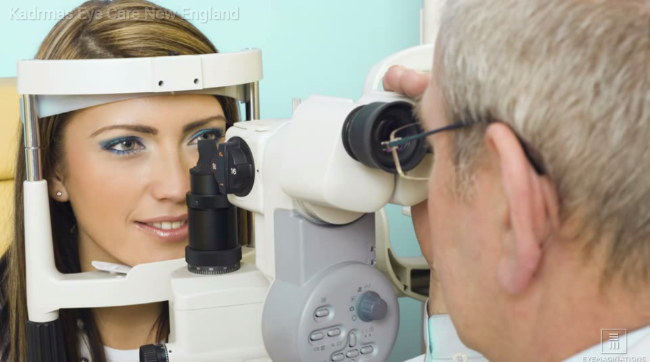Complete Eye Exam
As vision problems and eye diseases can develop at any age and many eye conditions that affect vision may develop before symptoms start to arise, routine eye exams can help ensure a lifetime of good vision and healthy eyes.
Based on the American Academy of Ophthalmology (AAO) recommended complete eye exam schedule for adults and our collective years of experience diagnosing and treating eye conditions and vision loss, we recommend the following eye examination schedule based on age:
In addition to the exam schedule listed above, the AAO and our eye doctors recommend the use of protective eye equipment when playing sports, working with tools or chemicals, and doing yard work at any age. Eye protection can prevent vision-threatening accidents and trauma, which can happen at any age. For people at risk for certain eye conditions, we recommend having routine eye exams more frequently earlier in life. For people with diabetes, we recommend having a yearly eye, regardless of your age due to the risk of developing diabetic retinopathy. People at risk of glaucoma, as well as other eye conditions such as cataracts and macular degeneration, have a better chance of preserving vision if they are detected early and monitored regularly by an ophthalmologist. A complete or routine eye examination includes the following:
Dilated Eye Exam / Slit Lamp ExaminationFor this examination, your eye doctor will put dilating eye drops in your eyes to widen your pupils, allowing the doctor to examine your retina and optic nerve. This allows your doctor to look for signs of retinal disease, macular degeneration, glaucoma, and other eye conditions. Tonometry
For this examination, your eye doctor will put numbing drops containing fluorescein (a type of dye safe for optical use) in your eyes. The doctor then uses a device called a tonometer to measure your intraocular (eye) pressure. The results of this test will help your eye doctor understand the condition of your eyes.
Visual Acuity Test
This test determines the smallest letters you can read, one eye at a time while wearing your glasses or corrective lenses if you have them, on a standard eye chart at a distance of 20 feet. As each eye is tested separately, you will have to preform this test twice, once on each side, while your other eye is covered. You will also be asked to read a card held approximately 14 inches in front of your face, again one eye at a time.
RefractionRefraction is used to determine your ability to see at all distances near and far, as well as diagnose diseases of the retina and cornea. It allows your eye doctor to determine if you have normal 20/20 vision or refractive error(s), including nearsightedness, farsightedness, astigmatism, or presbyopia. Further, your eye doctor uses your results to determine the appropriate prescription for your eyeglasses or contact lenses, as well as your need for bi-focal or progressive lenses.Using a device called a phoropter or refractor, your eye doctor tests each eye individually, asking you to read a standard eye chart as you look through different lenses. As your doctor quickly changes the lenses of the phoropter, he or she will ask you which lens gives you the clearest vision. Depending upon the results and findings of your complete eye exam, as well as your risk factors for certain eye diseases, your eye doctor may recommend further testing. We’ll discuss those specialized exams in our fifth and last post of this blog series on saving your vision. As we’ve seen, a complete eye exam is vital to ensuring good vision and healthy eyes, as well as detecting any early signs of disease and monitoring any conditions that may be present. But did you know that a complete eye exam is important to your general health and can give doctors a glimpse into your overall health? By examining your eyes, your eye doctor may be able to detect early warning signs of certain health conditions such as diabetes, high blood pressure, high cholesterol, and numerous other problems. To learn more about complete eye examinations, please visit our routine eye examinations for adults webpage, as well as stay tuned for the last two blog posts in this National Save Your Vision Month series:
Specialists in Complete Eye Examination
If you are due for a complete eye examination, please contact us to schedule an appointment with our general ophthalmologists or optometrists:
We offer complete eye examinations in all five of our offices on the South Shore and Cape Cod. Comments are closed.
|
EYE HEALTH BLOGCategories
All
Archives
July 2024
|
|
Kadrmas Eye Care New England
55 Commerce Way, Plymouth, MA 02360
14 Tobey Road, Wareham, MA 02571 133 Falmouth Road (Rt 28), Mashpee, MA 02649 |
Phone Number:
1-508-746-8600 Hours: Monday through Friday — 8 AM – 4:30 PM |


 RSS Feed
RSS Feed
